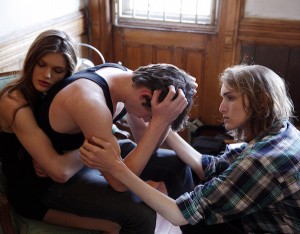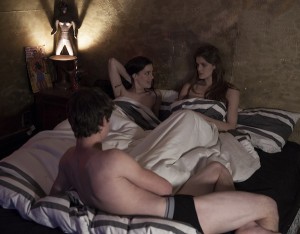Bizarre: An interview with director Etienne Faure
With his new film Bizarre hot off the editing table, we had a chat with director Etienne Faure about his reasons for choosing to locate his film in the heart of Brooklyn’s eccentric nightlife, and for telling the story through the eyes of a French youth.
How are you finding the Berlinale? How does your film fit into your part of the Panorama programme?
Panorama is a nice place because movies are often different, very interesting and more independent, so it’s a good section for my movie, I think. And Berlinale is the perfect place for us because the movie is brand new. We only finished the first copy about ten days before the festival, they made the selection after they saw what we call a “walking copy” in December, so it’s very fresh, very new, and for us it is the first screening in front of an audience.
What motivated you to make this film, and why did you make it now?
First the place, the Bizarre bar in New York: it’s a bar and a club, a mix of lots of things, it is completely incredible and I said: “Ah, we have to shoot something in this place.” Initially, we were talking about a documentary and I said “no I would like to make a feature in this place.” So the beginning of the project is the bar, and then the story of this place; this kind of place is very ephemeral. I wanted to talk about ephemeral things, I wanted to talk about the young, and the ephemeral way this kind of place is always changing, I wanted to say: “Yes in 2014 it was like this.”
There is quite a lot of these coming-of-age dramas – the transition of childhood into adulthood, and the idea of young people coming to cities to try to find, or lose, themselves – why do you think this is something currently popular in the media?
 Well, first there is the city of New York. When you ask the young people now: “What kind of city would you like to visit or like to live,” everybody wants to go to New York. There’s something about the thought of the city that excites the young people. In my movie, the young guy comes because it’s like a specific paradise, a specific place, although we can also see that he has run away because of something, someone, a family problem. And so he goes to this exciting place where, still today, we think that everyone can be happy and everyone can find a job. We see, of course, in the beginning of the film that this guy is unhappy and alone, and doesn’t know what to do or what can happen.
Well, first there is the city of New York. When you ask the young people now: “What kind of city would you like to visit or like to live,” everybody wants to go to New York. There’s something about the thought of the city that excites the young people. In my movie, the young guy comes because it’s like a specific paradise, a specific place, although we can also see that he has run away because of something, someone, a family problem. And so he goes to this exciting place where, still today, we think that everyone can be happy and everyone can find a job. We see, of course, in the beginning of the film that this guy is unhappy and alone, and doesn’t know what to do or what can happen.
And do you have any links to Maurice? Is there some kind of autobiographical element?
No. I’ve always made movies that seem very personal, you know, and in fact, they are always stories that are not my stories, they seem personal but they are absolutely not my story. It’s only in my dreams and in my mind.
Something I found interesting right at the beginning of the film is the voice over the young boy, and references to you as a director: “I’m speaking English because the director told me to” and “I’m not really here.” There’s this kind of self-referential, existential thing in the film. Can you say something about that?
 Yes I told you, this is not my story, but I am not the kind of director who wants to hide behind the personalities in the movie. This kind of boy represents the youth and, when I was talking about something ephemeral before, I mean that these boys represent a period in life that is very short, this period in your twenties where everything seems to be possible. You are discovering a new life, and also when you have a beautiful face everybody is looking at you, but I also wanted to show that this period is very short.
Yes I told you, this is not my story, but I am not the kind of director who wants to hide behind the personalities in the movie. This kind of boy represents the youth and, when I was talking about something ephemeral before, I mean that these boys represent a period in life that is very short, this period in your twenties where everything seems to be possible. You are discovering a new life, and also when you have a beautiful face everybody is looking at you, but I also wanted to show that this period is very short.
So this guy is in this period, and everybody is looking at him; they want to possess him for a short time maybe. I wanted to, like an artist, express my feelings about this period, so when he says that at the beginning, it is because I, the director, am thinking about youth, about freedom, about making things in cabaret et cetera.
There’s an improvisation element to some of the text. Was this a result of your direction?
I wanted the actors to be free. I had some situations that I explained to them and then they could run for free within them, with their own words, because I wanted a familiar way of speaking, also for them to speak as a New Yorker would speak, how someone from Brooklyn would speak.
Was there anything bizarre that happened while filming in the Bizarre?
Not really. But I didn’t show some of things because they were too hard for cinema, I think.
I didn’t want the shows [in the club scenes] to just illustrate the movie. I selected shows which meant something about the movie, sexual relations between boys and girls, blood and violence, a show against racism and a show against homophobia. There were many more [acts] I could have shown, but I tried to make a good resumé that could happen in this place.
Is there a style that defines your work?
What is really important for me is to be independent. I make movies on a low budget, this is a low budget but completely independent of the industry. There is Hollywood with a lot of money, and on the other side you have the very small shops that are making artisan films. I am this kind of director, and I want to stay like this because this is how you can have more creativity; I can talk about exactly what I want, I can have the kind of actors I really want. So I want to be considered as an independent and free director. Independence and freedom is what I want to have in my movies. To be free.
So, what’s next?
The next project is called River Bank, and we will shoot in September. It will be an English movie too, which we will shoot in a big forest in North America. A movie of five male characters who are isolated in a forest, nothing more. It is a very simple.
Thank you. Anything you want to add?
I like talking to English people because it is a country I love very much. What I love in people, all kinds of different people is spirit and eccentricity, I like this very much. So I am very happy to talk with you.
Sarah Rutterford
Bizarre does not yet have a UK release date.
Read more of our reviews and interviews from the festival here.
For further information about Berlin Film Festival 2015 visit here.
Watch the trailer for Bizarre here:
























Facebook
Twitter
Instagram
YouTube
RSS